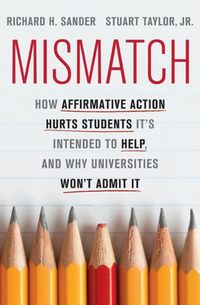

Purchase
Mismatch, November 2012
Hardcover / e-Book
Mismatch, November 2012
Hardcover / e-Book
How Affirmative Action Hurts The Students It's Intended To Help, And Why Universities Won't Admit It
Basic Books
November 2012
On Sale: November 13, 2012
304 pages
ISBN: 0465029965
EAN: 9780465029969
Kindle: B008RZRLHA
Hardcover / e-Book
Add to Wish List
Non-Fiction
Affirmative action in higher education started in the late 1960s as a noble effort to jump-start racial integration in American society and create the conditions for genuine equal opportunity. Forty years later, it has evolved into a swampland of posturing, concealment, pork-barrel set-asides, and—worst of all—a preferences system so blind to its own shortcomings that it ends up hurting the very minorities educators set out to help. Over the past several years, economist, law professor and civil rights activist Richard Sander has led a national consortium of more than two dozen nonpartisan scholars to study the operation and effects of preferences in higher education. In Mismatch, he and journalist Stuart Taylor present a rich and data-driven picture of the way affirmative action works (and doesn’t work) in this setting. Though their liberal leanings would indicate support for race-based policies, Sander and Taylor argue that the research shows that affirmative action does not in fact help minorities. Racial preferences in higher education put a great many students in educational settings where they have no hope of competing—a phenomenon that they call “mismatch.” American law schools provide a particularly vivid illustration of how “mismatch” harms the educations and careers of many minority students. Compelling evidence shows that racial preferences double the rate at which black students fail bar exams and may well in the end reduce, rather than increase, the aggregate number of black lawyers. Moreover, because preferences are targeted at upper-middle class minorities, they help shut low-income students of all races out of much of higher education. If you’re black and poor—or white and poor, for that matter—your chances of stepping into the halls of some of the nation’s most elite institutions are no greater than they were in the 1960s. Unfortunately, the academic establishment is only committed to symbolic change, and it will undermine any research that contests its reflexive political correctness and challenges its sacred cows. Sander and Taylor argue that university leaders and much of America’s elite have become so deeply committed to an ideology of racial preferences, and so distrustful of broader American public opinion on these issues, that they have widely embraced regimes that ignore the law, hide data, and put out systematic misinformation on their own racial policies. Sander and Taylor conclude by looking at data on how to level the racial playing field in higher education. Existing studies, they argue, suggest that early childhood interventions are much more likely to produce success down the line.
Comments
No comments posted.
Registered users may leave comments.
Log in or register now!
| 


 © 2003-2025 off-the-edge.net
all rights reserved Privacy Policy
© 2003-2025 off-the-edge.net
all rights reserved Privacy Policy